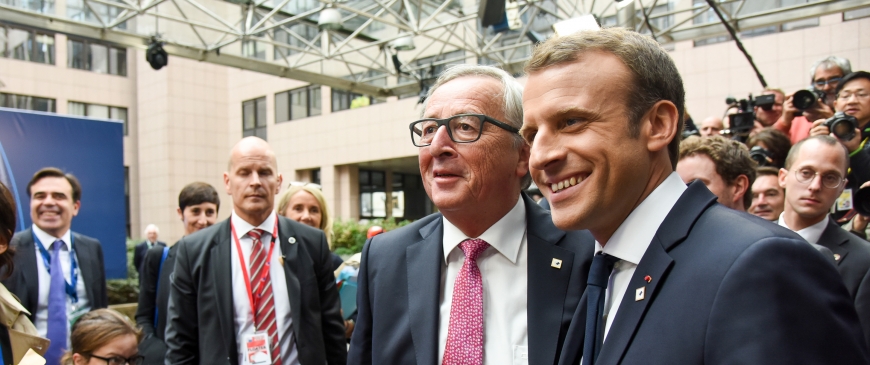
Fast forward to two-speed Europe
There’s a feeling among European leaders that the bloc has weathered the worst of its recent crises — euro, refugee, Brexit — and should now turn its focus to the future.
The question now: What should that future look like? Is European Commission President Jean-Claude Juncker’s vision of a more integrated union the right way forward? Or should we be heeding French President Emmanuel Macron’s call for a more flexible bloc?
If the EU wants to survive its (inevitable) future crises, the answer is easy. The only real option is to get behind Macron’s vision: Leave reluctant countries behind and allow others to move ahead on key policies.
It won’t be easy, of course. The French president has plenty of opponents. Traditional federalists want to use the departure of the foot-dragging Brits to push remaining EU members closer together. They worry that too much “variable geometry” will weaken EU institutions, a new report by the Centre for European Reform has found. Meanwhile, Euroskeptic Central Europeans — including Poland’s ruling party — worry that in a Europe of “concentric circles” the dominant eurozone countries will treat those on the outer tiers as second-class citizens.
But despite these challenges, current political trends make it likely the EU will move toward Macron’s model. The French president has found a powerful partner in German Chancellor Angela Merkel, with whom he is preparing new initiatives on eurozone governance. These are likely to help further integrate the monetary union and create new eurozone institutions, including its own budget and system of parliamentary scrutiny.
Brexit is also pushing the EU in the direction of more flexibility, as a number of governments draw the lesson that the EU should try harder to accommodate different objectives and priorities among its members. Italian ministers, for example, reckon that it isn’t realistic to expect that every EU country will want to sign up to the same policies.
A more supple EU would be harder to break apart and more viable in the long run. Macron is right to say that governments wary of integration should not impede more ambitious countries from moving ahead. This more ambitious group simply needs to leave the door open for those on the periphery to join in later — if and when they meet a set of objective criteria for entering that inner circle.
Relieving countries from the duty of joining in certain policies could also help lower domestic political pressure. Despite Warsaw’s current hostility to Macron’s ideas, for example, many Poles will likely prefer an EU that doesn’t force them to join the euro.
A more flexible EU would also help revive the enlargement process and its flagging neighborhood policy.
Enlargement has ground to a halt in recent years, partly because voters in some member countries oppose the idea of Western Balkan countries joining the club and fear the free movement of their workers once they are in. If the bloc offered “membership minus” to some applicants — meaning they would not take part in certain policies, such as free movement — opposition to enlargement would diminish.
The same is true when it comes to the EU’s approach to its neighbors. Brussels has offered countries to the east and south too little incentive for entering its orbit. The EU should give selected neighbors that are unlikely to become full-fledged members the chance to take part in specific policies. Just as Turkey has a customs union with the bloc, Tunisia or Ukraine, say, could join parts of the single market or discussions on foreign policy.
To be sure, there are limits to how far the EU can take this scheme. The bloc couldn’t function smoothly if every member was not involved in the single market, competition policy and trade, environmental rules and foreign policy. But that still leaves room to accommodate different interests.
The eurozone, Schengen, policing and defense cooperation are all policy areas that currently allow members to opt out. That logic should be extended wherever possible, allowing members to opt out of the databases that facilitate cooperation on security, the harmonization of corporate taxation or new arrangements for the sharing of intelligence, for example.
Moving toward more flexibility is a challenge to the EU’s legal order — which the bloc’s institutions in Brussels will, rightly, seek to protect like hawks. Many in the European capital will insist that if some non-members are allowed to take part in policies such as defense, trade or some aspects of the single market, they must accept the entirety of EU rules and the jurisdiction of its courts.
But flexibility would undeniably make the bloc more attractive to potential applicants. Britain, not insignificantly, would be more likely to rejoin the bloc one day, if it could move into an “outer circle” that did not involve the euro, Schengen and other policies. The same would apply to an independent Scotland or Catalonia, or to countries reticent about European integration, such as Switzerland and Norway.
The U.K. government is currently focused on exiting the club, and few European leaders are in a hurry to draw the British closer once they are out. But in the long term, when Britain has experienced the chill winds of solitude, and when the EU recognizes that keeping the Brits at arm’s length is not good for anybody, both may come to see the value in creating more flexible “membership” solutions.
Charles Grant is director of the Centre for European Reform.
